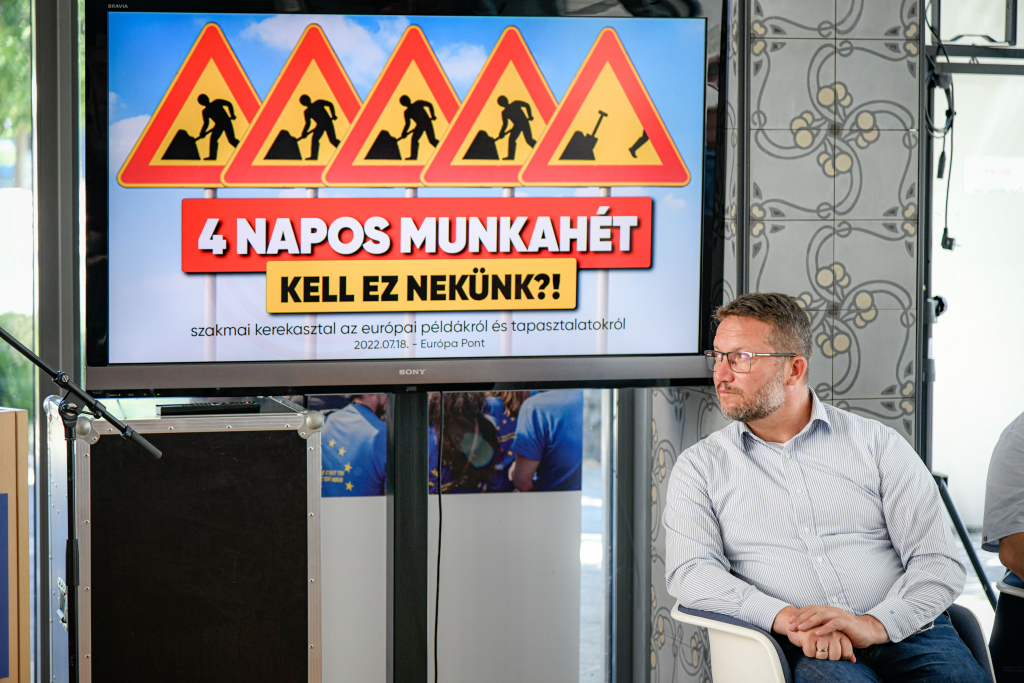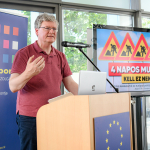Published: 19.7.2022
 „The labour market will and must change, there is no doubt about that, but whether it will change in the right direction and whether we understand the call of modern times is a much more open question,” said Socialist MEP István Ujhelyi at a professional panel discussion he initiated in the Europe Point in Budapest.
„The labour market will and must change, there is no doubt about that, but whether it will change in the right direction and whether we understand the call of modern times is a much more open question,” said Socialist MEP István Ujhelyi at a professional panel discussion he initiated in the Europe Point in Budapest.
At the conference, entitled „Four-day working week – do we need this?„, the MSZP MEP stressed that for many it may seem untimely to talk about changes in the labour market and working hours at a time when utility costs are rising, the opportunities for self-employed small taxpayers are declining and protests are taking place in the country, but all these factors together have a significant impact on the world of work, for which we must be prepared in good time.
Ujhelyi pointed out that there are already successful examples of the introduction of a four-day working week in many countries, but it is by no means certain that this will eventually become the norm, as some examples show that it is more useful to keep a five-day working week, but with six-hour working days instead of eight. „I can accept the argument that says we should reduce working hours by 20 per cent, but at the same time wages and productivity should remain at 100 per cent,” said the MSZP MEP in his opening speech at the conference.
Charlotte Lockhart, co-founder of the 4DayWeekGlobal movement, welcomed the participants in a video message. In it, she encouraged decision-makers in Hungary to think about productivity, which would be demonstrably increased by a four-day working week, and the benefits for people and society at large. „We know that reducing work time is good for nations. It’s good for our people and it’s good for our planet. But it is also good for business. So don’t be afraid, it’s easier than you think, and, when you’re ready, we are right beside you to help you run pilots and to help you get it across the line,” said Charlotte Lockhart in the video. In his capacity as organiser of the conference, István Ujhelyi added that they have agreed with the founders of the global movement to jointly launch training and pilot projects in Hungary in the autumn linked to the introduction of the four-day working week.
 In his speech, László Andor, former EU Commissioner for Employment and Social Affairs, said: „This is an initiative that seems to be an excellent proposal, but no one should think that it will solve all the problems.” The European expert said that experience so far shows that the move to a four-day working week indeed helps, but that it is also important to monitor and manage the side effects.
In his speech, László Andor, former EU Commissioner for Employment and Social Affairs, said: „This is an initiative that seems to be an excellent proposal, but no one should think that it will solve all the problems.” The European expert said that experience so far shows that the move to a four-day working week indeed helps, but that it is also important to monitor and manage the side effects.
László Andor said that according to the results of the programmes seen so far, the switch to a four-day working week improves quality of life at work, thus having a positive impact on productivity (for example, less absenteeism and sickness leave takes place), there are substantial benefits in terms of sustainability and gender division of labour, but the former EU Commissioner also pointed out that the more years of healthy working life a person can spend in the workplace, the more the proportion of years spent in retirement and working life will improve, which is particularly important from a demographic perspective. Andor also cited the historical example of „Fordism”, pointing out that Henry Ford was the first to introduce the five-day working week instead of the six-day week, and that this not only increased productivity but also the esteem of his workers, who were „less worn out” along the assembly lines. Andor pointed out, however, that one of the biggest obstacles to the introduction of a four-day working week is the legal system in the countries concerned, and he said this was a particularly serious problem in Hungary, where, he said, legislators had moved in the opposite direction with the so-called „slave law”. The former EU commissioner said that if the four-day working week was to be introduced, the first thing needed to be done was to improve the management culture and increase social dialogue.
 „In Hungary, many people are already applying the four-day working week, we just call it doing twelve hours,” said Zoltán László, vice-president of the VASAS Trade Union Confederation, speaking at the panel discussion. He said that Hungarian workers are heavily under pressure, there is a lot of overtime, and this also affects their health. As regards the four-day working week and the reduction in working hours, he stressed that the first thing to do was to explain to the workers concerned that this did not mean less pay. László also listed as a risk that if the working time is reduced, the majority of Hungarian workers will spend it not on rest but on extra work, on „moonlighting”, which could call into question the whole purpose of the project. According to Zoltán László, work organisation in Hungary is not flexible enough at the moment, so if the introduction of a four-day working week is not well prepared, it could face resistance not only from employers but also from employees. „The workplace of the future will have two people: a man and a dog. The dog will guard the machines, the man will feed the dog,” added the union leader, illustrating the changes in the labour market.
„In Hungary, many people are already applying the four-day working week, we just call it doing twelve hours,” said Zoltán László, vice-president of the VASAS Trade Union Confederation, speaking at the panel discussion. He said that Hungarian workers are heavily under pressure, there is a lot of overtime, and this also affects their health. As regards the four-day working week and the reduction in working hours, he stressed that the first thing to do was to explain to the workers concerned that this did not mean less pay. László also listed as a risk that if the working time is reduced, the majority of Hungarian workers will spend it not on rest but on extra work, on „moonlighting”, which could call into question the whole purpose of the project. According to Zoltán László, work organisation in Hungary is not flexible enough at the moment, so if the introduction of a four-day working week is not well prepared, it could face resistance not only from employers but also from employees. „The workplace of the future will have two people: a man and a dog. The dog will guard the machines, the man will feed the dog,” added the union leader, illustrating the changes in the labour market.
 „The human body was not designed to work ten hours a day in a physical or mental field”, said Dr. Gábor Hollósy-Vadász, psychologist and adjunct professor of occupational psychology and human resource management at Budapest Metropolitan University. He stressed that white collar workers can only work with high concentration and efficiency for a maximum of four to five hours a day, and if they do not recuperate properly, they will not be able to perform even that much the next day. The assistant professor said that a six-hour working day would be ideal both psychologically and physically, and that he therefore advises not to introduce a four-day working week, but to keep the five-day working week, but with the reduction of the working hours to five or six a day. Hollósy-Vadász added that for manual workers it makes more sense to shorten the working week from eight hours a day to four days, but added that it is also important to be aware of and prepare for the fact that the workers concerned spend their freetime in a useful and valuable way. The biggest risk of the four-day working week initiative is the growing workaholic tendency and the increasing expectations of companies, with many people working more than five days a week, checking emails and communicating constantly on work matters.
„The human body was not designed to work ten hours a day in a physical or mental field”, said Dr. Gábor Hollósy-Vadász, psychologist and adjunct professor of occupational psychology and human resource management at Budapest Metropolitan University. He stressed that white collar workers can only work with high concentration and efficiency for a maximum of four to five hours a day, and if they do not recuperate properly, they will not be able to perform even that much the next day. The assistant professor said that a six-hour working day would be ideal both psychologically and physically, and that he therefore advises not to introduce a four-day working week, but to keep the five-day working week, but with the reduction of the working hours to five or six a day. Hollósy-Vadász added that for manual workers it makes more sense to shorten the working week from eight hours a day to four days, but added that it is also important to be aware of and prepare for the fact that the workers concerned spend their freetime in a useful and valuable way. The biggest risk of the four-day working week initiative is the growing workaholic tendency and the increasing expectations of companies, with many people working more than five days a week, checking emails and communicating constantly on work matters.
Economic journalist Péter Szakonyi also pointed out at the conference that the negative impact of people not necessarily knowing what to do with the time spent away from work already showed during the covid pandemic, that is, they are not able to make good use of their increased free time, which can lead to new mental illnesses and frustrations, and the Hungarian health system is not prepared to deal with these. Szakonyi also pointed out that there are currently labour shortages almost everywhere, tensions in supply chains, and the economic crisis will significantly transform the labour market, which could also have an impact on the acceptance and success of the four-day working week initiative. According to the journalist, the first effective test for the introduction of a four-day system could be in public administration, in parallel with the development of e-government.
In response to a question at the event, MEP István Ujhelyi, who launched the initiative, added: in Hungary, a number of smaller, mainly IT companies have successfully introduced this working system, but multinationals, in Hungary, for example, Telekom, have also launched a pilot programme on this, which is currently being evaluated, while Szombathely among local authorities is currently also preparing a similar programme. István Ujhelyi reiterated that in the autumn he intends to „make loud noise” on the issue not only in the European Union but also in Hungary, and therefore, in addition to European decision-makers, he intends to launch initiatives and programmes on the subject among Hungarian municipalities and businesses, counting on the partnership of the earlier mentioned international movement 4DayWeekGlobal.
Budapest – 18/7/2022
